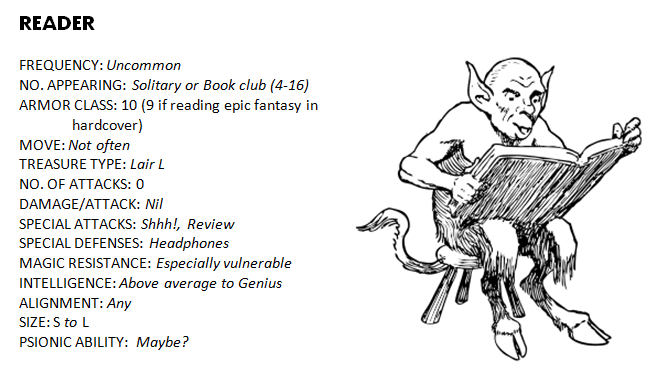
A reader is a solitary creature by nature. When engaged in their eponymous activity, readers travel via unknown means to another place, time, or both. While in that other place, their physical bodies are often ignored for hours on end. While their bodies still require food, water, and sleep, through rigorous mental training they learn to suppress their physical needs to continue engaging in their reading.
Scholars have long wondered whether there was a relationship between readers and listeners. It was not until the discovery of audiobooks that a definitive link was made between the two. This is still considered to be a niche overlap.
The activity cycle of the reader varies, but is usually consistent for a given individual. Some readers are largely noctural, others are most active while traveling or basking in the sun.
Traditional readers are libravors, and consume an average of 200-350 words while active (though younger readers may consume at a much slower rate). In recent years, many have added electronic media to their diets, becoming multimediavores. A smaller number have switched over entirely and become electronivores. To-date, these subcultures have coexisted peacefully.
Readers have a symbiotic relationship with writers, a sub-grouping of reader that branches out into producing food for the rest of their brethren. Through a meritocratic system, readers support writers who produce the most satisfying nourishment and lend their support in the form of reviews and book purchases, which the writers rely on for their own sustenance. Writers will still sustain themselves on books as well, but receive no nourishment from the books they write, instead relying on other writers to provide for them.
Languages spoken by readers include all languages spoken on Earth as well as Elven, Klingon, and Dothraki.
In combat, readers are prone to using logical arguments or pleas for mercy in preference to attacks, and may resort to cowering or calling for help. Readers or action thrillers or swashbuckling adventures may attempt to use improvised weapons. Readers of YA and epic fantasy have been known to attempt magic (with mixed results). Readers who possess levels in player character classes will invariably use those skills in preference to the paltry skills of the base reader.

I am digging this. While I thankfully don’t speak Klingon, gratefully don’t speak Elven, and regrettably don’t speak Dothraki, it’s good to know I might be able to communicate with these “readers” by way of the two languages I do know: English and Bad English.
Good stuff.
Many readers are especially vulnerable to Bad English. It disrupts their thought processes and temporarily negates their mental teleportation ability.
Size? What in the world is that for? I’m an avid reader and gamer, have above average intelligence (both in measured psych tests as well as my GPA in Constitutional Law), and I’m plus size.
That’s a highly ignorant statement for one who purports to be intelligent. . . . So much so that it speaks not of intelligence, but of bias, narrow minded, shallow thinking.